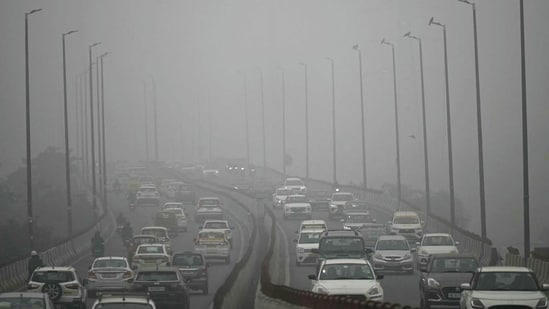
The air quality in Delhi witnessed a slight improvement on Wednesday but remained in the “severe” category, with the 24-hour average Air Quality Index (AQI) recorded at 419, down from 444 on Tuesday. This comes after touching nearly 500 in the “severe plus” category earlier this week, marking one of the worst air quality levels since AQI tracking began in 2015, according to the Central Pollution Control Board (CPCB).
Current Air Quality Status
Despite the minor improvement, smog continues to envelop Delhi and its neighboring NCR regions, including Noida, Ghaziabad, and Gurugram. Key locations such as Anand Vihar (406), Jahangirpuri (437), and Dwarka Sector-8 (404) reported AQI levels well into the severe category early Thursday morning.
Visuals from popular locations like India Gate revealed people braving the smog for morning walks and jogs along the Kartavya Path, underscoring the ongoing public health challenges posed by the pollution.
Revised CAQM Guidelines
In a significant development, the Commission for Air Quality Management (CAQM) has updated its Graded Response Action Plan (GRAP) guidelines. The revised rules mandate the closure of schools in Delhi and key NCR districts, including Gurugram, Faridabad, Ghaziabad, and Gautam Buddh Nagar, under Stages 3 and 4 of GRAP.
Earlier, decisions regarding school closures and other measures were left to the discretion of state governments. Now, these measures are compulsory for the designated districts, while other NCR areas retain flexibility in decision-making.
Additionally, the revised guidelines require state governments to stagger office timings for public offices and municipal bodies in Delhi and the affected NCR districts. This directive is part of efforts to reduce vehicular emissions and ease congestion during peak hours.
Supreme Court’s Intervention
Earlier this week, the Supreme Court criticized the CAQM for its delayed implementation of Stages 3 and 4 of GRAP. The apex court emphasized the urgent need to close schools across the NCR to safeguard children from hazardous pollution levels.
Previous Measures
Under the previous GRAP guidelines, decisions on halting physical classes were discretionary. Stage 3 allowed for the suspension of in-person classes for students up to Class 5, while Stage 4 extended this option to students in Classes 6 to 9 and 11. These measures are now mandatory for certain districts under the updated rules.
Outlook
As Delhi continues to grapple with toxic air, authorities are under pressure to enforce strict pollution control measures and provide relief to residents. The effectiveness of the revised guidelines will be closely monitored in the coming days as the city awaits a more significant improvement in air quality.
Sources By Agencies




